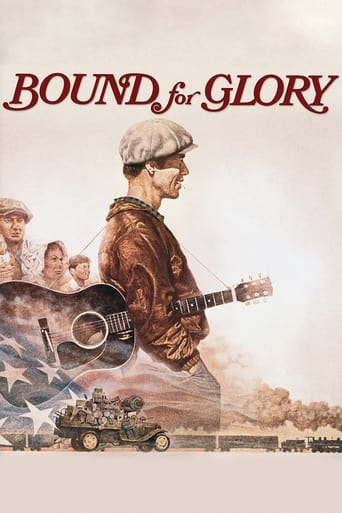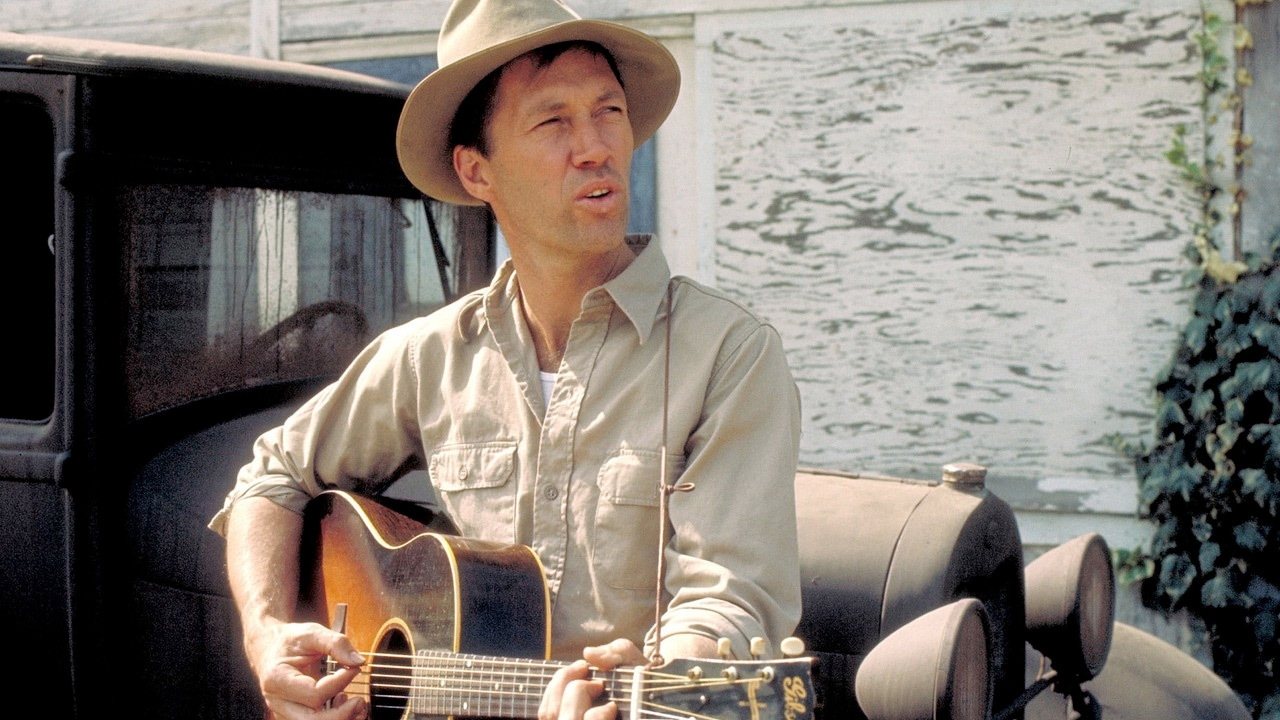Scott LeBrun
"Bound for Glory" is a very long but utterly engrossing musical biography about an entertainer worth getting to know. That man is Woody Guthrie (David Carradine), a sign painter from Pampa, Texas during the Great Depression era. Determined to make some move away from his hardscrabble existence, and plagued by a case of wanderlust, he takes leave of his family and heads for California. This he did like so many other people of the period who believed that the West Coast held more promise. Inspired by a singer named Ozark Bule (Ronny Cox), he uses his musical talents to give voice to the scores of Americans who were struggling to get by.It's true that we don't learn a LOT about Guthrie in the course of this two and a half hour long film, but it's still easy to get involved in the story. (Which, other than a scant few people, consists mostly of fictional characters.) It can boast some truly stylish and thoughtful filmmaking, thanks to Oscar winning cinematographer Haskell Wexler, screenwriter Robert Getchell (adapting Guthries' autobiography), and renowned director Hal Ashby. It does often look like a painting of this sad chapter in American history, come to life. But it goes far on the spirit of its main character. Carradine, giving the performance of his career, makes Guthrie a good, simple, pleasant person who, in the end, is true to himself. Although he is able to make a good living performing for the radio, he realizes that he has to sacrifice too much integrity in order to please greed-motivated sponsors. He tires of having to deal with people with their own agenda, and gets on the bad side of authority figures who dislike his open support of unions.Carradine is extremely well supported by a rich gallery of familiar faces, with meatier roles going to Cox, as the likeable Ozark, Melinda Dillon (who plays both the singer Memphis Sue and Guthries' wife Mary), Gail Strickland (as a rich society type who helps to run a soup kitchen), John Lehne, as the disapproving radio boss, Ji-Tu Cumbuka as an upbeat hobo, and Randy Quaid as the frustrated migrant worker Johnson. There's several other people you'll also recognize: David Clennon, Mary Kay Place, M. Emmet Walsh, Brion James, James Hong, Robert Ginty, and Bernie Kopell in an uncredited cameo as Baker the agent.The soundtrack is, of course, wonderful, with a superb assortment of Guthrie tunes; film composer Leonard Rosenman also won an Oscar for adapting Guthries' music into film score.Ultimately, this is an uplifting story; it may have some down sides along the way, but it endears itself to us the way that it portrays this entertainer who truly wanted to represent the American people.Eight out of 10.
romanorum1
It is 1936 in Pampa, Texas during the oppressive Dust Bowl. Work is hardly available, even for 24 year-old sign-painter Woody Guthrie (David Carradine), who doesn't seem to mind as he spends time with his friends and singing and playing the guitar. Woody's first wife, long-suffering Mary (Melinda Dillon), is most concerned about the lack of cash for the growing family (two little girls thus far). After a dust storm strikes, Woody simply packs up and heads for California, where jobs are supposedly plentiful. He leaves a note for Mary, "Going to California. Will send for you all." Constantly struck with wanderlust (as we shall see), Woody is really a drifter. So Woody, along with many hobos of the Great Depression, hitchhikes and rides the rails on his journey. By the way, this is the largest migration in US history. Along the way Woody lives in migrant worker camps and "Hoovervilles." Along his travels he meets all kinds of characters, including Slim Snedeger (Ji-Tu Cumbuka) and unionizing folk singer Ozark Bule (Ronny Cox). At a migrant camp Ozark and Woody sing and extort the workers to unionize until thugs arrive and break up the gathering. As Woody observes the miserable plight of many Americans, his social conscience is so raised that he composes and sings many of his folk songs. Note the memorable scene atop a boxcar where Woody plunks away at his guitar while he composes the words to "This Land Is Your Land." Later on there is another set where Woody waltzes into a factory and exhorts the workers to unionize; he is promptly beaten up by security folks. Ozark Bule helps Woody to get a radio job at KTNS for twenty dollars a week. Most of the mail from listeners is positive, and Woody and singing partner Memphis Sue (Melinda Dillon again) get an offer of thirty-five dollars weekly. Station manager Locke (John Lehne), concerned about his new sponsors, tells Woody not to sing any controversial songs. After all, the sponsors pay for what they want to hear, and they do not want provocative subject matter. But there really is no compromise for Woody. Note that this scene is really inaccurate, as Woody was really advocating support of the Soviet Union. (Then when Russia's Stalin signed the August 1939 non-aggression pact with Nazi Germany, the leftists were stunned and . . . Oh, never mind!)An agent, Baker (Bernie Kopell), plans on getting Woody an offer to play for CBS as long as his songs are not controversial. No thanks! And as there is no middle ground, it is time for the detached Woody to move on. Ultimately Woody will work his way to New York where there are many people and unions who will hear the message of his music. Woody is destined to gain even greater acclaim than previously. The movie focus is on a slice of Woody's life (1936-1940), loosely based upon his 1943 autobiography. The famous folk singer-songwriter and musician is flawed and neglectful of his family, even after he relocates them to California. Although married, he was a notorious womanizer. In his real life the detached Woody had three wives and seven children (son Arlo was not born until 1947). But Woody inspired folks who had nothing except hope; he said one's skin color is not important. Despite his defects he remained idealistic and gave up various monetary offers. Still, he was not an easy man to live with. The songs, performed by David Carradine, include "This Train Is Bound for Glory," "Talking Dust Bowl Blues," "I Ain't Got No Home," and of course the famous "This Land Is Your Land." The feature may be slow-paced, but there are also impressive golden-colored cinematography and scenic views. There are also authentic and stunning period details, like the shabby frame houses and jalopies. The acting is natural; Carradine is very good as the folk singer who never surrenders his deeply felt convictions. In fact in this movie Carradine is Woody. "Bound for Glory" received an Oscar nomination for Best Picture, but understandably lost out to "Rocky," a "top 100 of all time" movie.
dungeonstudio
Till I saw this movie, I always viewed 'folk music' as tree hugging save the world hippy happy tunes. But from this movie I now understand the emphasis on 'folk'. And really it's not too different from 'punk'. Woody sang about the people he was singing to. Hardships and hopes. Decency before profit. And how great America is, even when America wasn't doing so great. Hal Ashby put's a 'grit' not only into, but onto the film. I could literally feel the dust and grime on me as I watched. And say what you will about David Carradine being a cantankerous S.O.B., but he was cast and played Woody perfectly. To steal a line from Dr. Strangelove - "Woody is a man of the people. But he's also a 'man', if you follow my meaning..." And Ronny Cox I thought was stellar in his performance. All in all, the movie gives me great appreciation for the depiction of Woody, the depression era, and the unsung brilliance of Hal Ashby and the cast. A must have for anyone that's into music, sociology, history, and/or just great film making!
SnoopyStyle
This biopic starts in 1936. Woody Guthrie (David Carradine) is struggling in the dusty small town of Pampa, Texas with his wife Mary (Melinda Dillon). Jobs are hard to find and everybody is looking to leave for California. He runs off to ride the rails and becomes one of the most influential folk singers.This is limited in excitement and tension. It's a quiet easy movie. It's quietness takes away some of the emotions in the movie. David Carradine is putting in a simple nice guy performance. There are some inventive camera work using the new steadycam. The look of the movie is one of faded dusty postcard. It's a pretty and interesting movie to look but it's not much more than that. It's a long winding road.


 AD
AD




